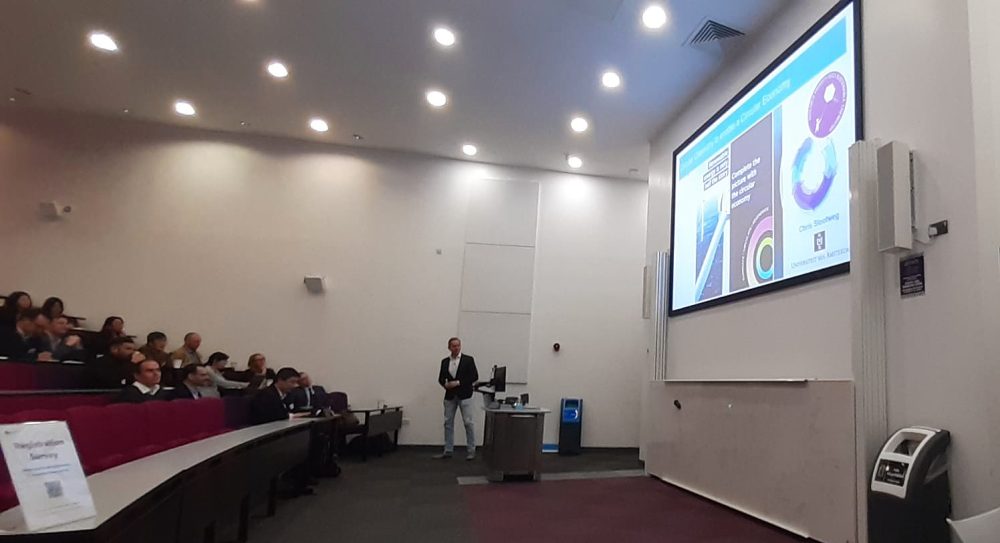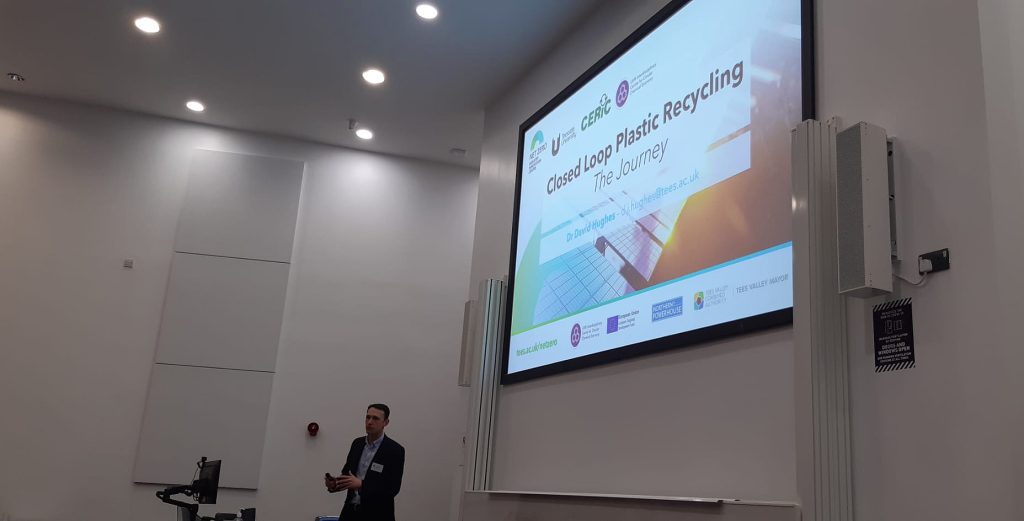CircularChem Showcase 2023 Reflections

The UKRI Interdisciplinary Centre for Circular Chemical Economy (CircularChem) held its annual research showcase at Loughborough University from 27th to 29th March 2023. The event gave the opportunity to present the cross-cutting research occurring within the Centre, whilst bringing together experts from academia, government, industry, and non-profit sector to discuss the progress on chemical circularity in a wider context.
Day 1
The showcase was opened by Professor Jin Xuan (University of Surrey, director of Circular Chem), giving an overview of the Centre’s work and agenda for the day. The first day concentrated on the progress made with the enabling technologies being developed by Theme 1 and outside of the Centre through a keynote speech and closing panel discussion.
Dr Chris Slootweg (University of Amsterdam) provided a thought-provoking keynote speech on ‘Circular chemistry to enable a circular economy’. Chris discussed the six elements of life, Carbon, Hydrogen, Nitrogen, Oxygen, Phosphorous and Sulphur (CHNOPS) their contribution to waste and the need to move to circular technologies to enable a more sustainable future. Phosphorous and Hydrogen garnered the most attention, a circular phosphate economy and clean hydrogen solution was proposed, underpinned by the concept of Safe and Sustainable by Design (SSbD).
There were a number of key messages taken away from the presentations and discussions after the close of day one. Fundamental research can provide the technological solutions towards a circular economy, from waste conversion to CO2 reduction. A shared vision and more resilient supply chain across the chemical sector needs to be created, which can be achieved by bridging the gap between academia and industry. Priority technology levers should be identified with market and regulatory drivers to push technologies through to deployment. The need for a suite of technologies in a transition to net zero was made evident.
Day 2
Onto day two with another welcome, this time from Dr Jon Wagner (Loughborough University, academic programme lead). The focus for day two was the interface between academia and industry. Presentations of emerging technologies from industry were given, including a session of successful SMEs projects with the NICER project, hosted by UKRI Innovate UK. The work from Theme 2 on process integration and whole system optimisation tied together the importance of collaboration between academia and industry.
The keynote speech for the day was ‘Close looped plastic recycling – the journey’, given by Professor David Hughes (Teesside University). David introduced the work currently being undertaken at the Net Zero Industry Innovation Centre (NZIC) with the ‘stuff4life’ project. The complexity of reprocessing materials was discussed, particularly with the recent successful supply chain mapping exercise undertaken for the Tees Valley Cluster. The next steps for NZIC were introduced with digital trade for the supply chain to improve transparency, efficiency, sustainability, and resilience of supply chains.

Day two finished with a special thank you to the event organisers Smita Jenna and Shadine Duquemin. With day two at a close, the presentations and discussions emphasised the need for continuous communication between industry and academia to enable resilience throughout the whole of the chemical supply chain. Additionally, it is important to consider the potential impacts that technological changes can make on biodiversity. The findings from day two made it clear there is no ‘silver bullet’ solution to sustainable alternatives to fossil-derived ethylene and transition to net zero.
Day 3
The final day was kicked off by Professor Peter Styring (University of Sheffield, Centre Policy Lead) highlighting that progress towards net zero is moving too slowly and our role as ‘custodians of carbon’ to change this. The work from Theme 3 and a guest presentation from WRAP reflected on the key factors required to accelerate circularity using policy levers, circular business models and public acceptance. A keynote speech was given by Dr Nick MacInnes from the Department of Environment Farming and Rural Affairs (Defra), before a final panel discussion closed the showcase.
During the keynote Dr MacInnes explained the role that government plays in a resource efficiency and circular economy. Reducing residual waste is seen as the number one priority for Defra. A number of policy levers that the government are implementing to address residual waste were described, such as unifying kerbside collection, producing the resource and waste strategy, using the waste hierarchy as a resource efficiency template, and underpinning these through legislation in the Environment Act.
Throughout the day, key opportunities were identified around de-risking technologies with long term investment, building consumer acceptance, ensuring value is created throughout the whole circular value chain, and how policy should be integrated into the decision-making process. Alternatively, mixed messaging from the media, lack of knowledge for sustainable development goals and awareness for businesses to become the leaders for the transition were identified as key barriers to net zero. There was unanimous agreement in the room that education, social and behaviour change are pivotal to achieve the transition to net zero.
Final thoughts
As I write this, sipping from my sustainable CircularChem coffee cup (courtesy of the event) and reflecting on the showcase, two things have been made apparent; First, a diverse range of expertise and innovation is needed for a circular economy of chemicals to succeed. Second, successful engagement across different disciplines can facilitate the changes necessary to achieve our sustainability goals more effectively than siloed research. The CircularChem centre is an example of how both of these reflections can be put into practice.
Matthew Royle, Research Assistant